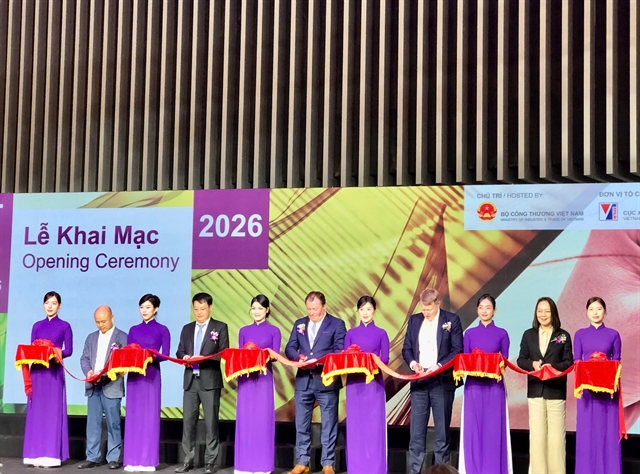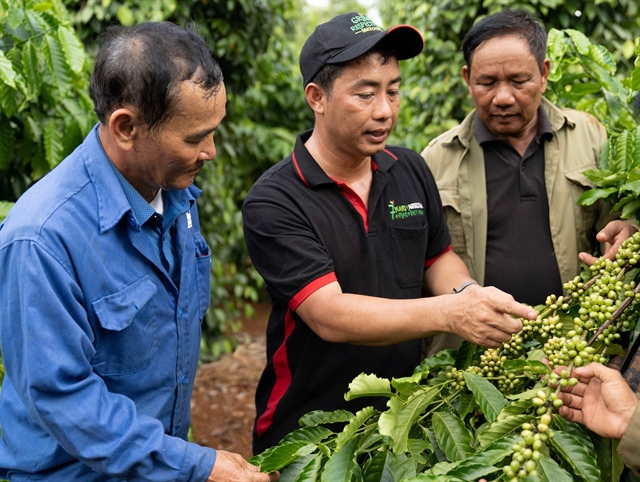 Economy
Economy

 |
| Nestle Vietnam staff shares sustainable coffee farming techniques with farmers. – Photo courtesy of Nestle Vietnam |
HÀ NỘI – Vietnamese businesses should optimise achievements of the Fourth Industrial Revolution and promote digital transformation to serve sustainable development, said Deputy Prime Minister Trần Hồng Hà at the 10th Việt Nam Corporate Sustainability Forum in Hà Nội on August 23.
In addition, nature-related policies should be integrated into business strategies and plans, Hà said.
To contribute to achieving sustainable development goals (SDGs) and fulfilling Việt Nam’s relevant commitments, more investments should be made in nature-based solutions to enhance ecosystem services, reduce greenhouse gas emissions, increase resilience to climate change, and create new opportunities for innovation and growth, he said.
Apart from big firms, small-and medium-sized enterprises, which are considered the backbone of the national economy, should play a role in sustainable development, the Deputy PM stressed.
He suggested domestic enterprises study and put in place regulations and criteria for sustainable development, promote the environmental, social, and governance (ESG) practice in business administration, join environmental protection efforts.
The Deputy PM also affirmed the Government’s strong commitment to building a favourable legal environment for businesses to complete the SDGs.
With a strategic vision, the Party and the State have identified policies and roadmaps to perfect mechanisms, policies and laws on green economy, low-carbon economy and circular economy towards net zero emissions, he stressed.
The Government always listens to opinions of the business community and focuses on policies and pilot models for the Just Energy Transition Partnership (JETP) in an effort to create an “ecosystem” of the renewable energy industry.
The Government will issue more mechanisms and policies on enhancing green economy and circular economy, and supporting businesses in technology transformation and research and development centre building, while promoting personnel training with new mindset of taking people as the subject, centre, momentum and resources of development, he said.
Vice chairman of the Việt Nam Chamber of Commerce and Industry (VCCI) and chairman of the Việt Nam Business Council for Sustainable Development (VBCSD) Nguyễn Quang Vinh provided updates on global sustainable business trends.
He stressed that the success of businesses should include their adaptation, resilience and recovery amid unprecedented challenges, as well as sustainable interests of the community, the society and the environment.
Vinh also suggested businesses change value and supply chains towards sustainability.
Also at the forum, Binu Jacob, managing director of Nestlé Việt Nam and VCBSD co-chairperson, shared about "dual transformation" in his business. Accordingly, innovation and sustainable development need to be carried out together to achieve business goals and also address social and environmental issues.
For decades, businesses have focused on total shareholder return (TSR). However, according to Binu Jacob, for sustainable development, businesses not only create value for shareholders but also need to create an impact for society (total societal impact - TSI).
At present, investors are increasingly interested in businesses that operate effectively and the operation also has a positive impact on the environment and society, contributing to solving social problems or climate change.
In Việt Nam, as one of the leading businesses in sustainable development, Nestlé is implementing many sustainable initiatives to create a positive impact on the environment and society, with priorities including physical and nutrition development for children, responsible purchasing, climate action, sustainable packaging, sustainable sourcing, and caring for water.
Cao Thị Ngọc Dung, VBCSD vice chairperson and chairwoman of Phú Nhuận Jewelry Joint Stock Company (PNJ) emphasised: “At present, balance between economic development and environmental protection has become one of the most important issues and an indispensable requirement for survival. With rapid change of technology, businesses cannot miss the opportunity to create a low-carbon, balanced and sustainable economy.”
According to Dung, the businesses are required to have innovation, grasp smart solutions, and use natural resources effectively. This not only helps the businesses to minimise the negative impact on the environment, but also to create a sustainable competitive advantage in the future.
In order to develop the supply chain of environmentally friendly products and services, Nguyễn Thị Ngọc Huệ, Director of Communications and External Affairs, AEON Việt Nam said the supermarket system has had a number of initiatives, such as use of eco-friendly bags.
However, Huệ said that the business has encountered some difficulties, including the high cost of environmentally friendly packaging materials due to the lack of technology investment and financial support for mass production.
AEON Việt Nam's representative suggested that the Government soon complete policies, regulations and infrastructure for the circular economy model as well as policies on environment and sustainable development.
According to Huệ, these policies will pave the way for manufacturers and distributors to increase investment in technology innovation, thereby making ecological products and materials more accessible to consumers.
The forum, jointly held by the VCCI and VBCSD, brought together more than 300 delegates, who discussed such issues as the circular economy, low carbon emissions, green supply chain, biodiversity preservation, and sustainable energy transition, among others. – VNS




